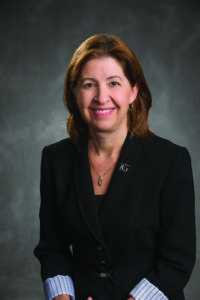American democracy is a lasting institution that aspires to the ideal of freedom and the shared responsibilities of citizenship, and we cannot take it for granted.
“Democracy requires an argument on its behalf,” Gustavus alumnus and scholar of American political thought Joel Johnson ’96 said recently on the College’s Learning for Life @ Gustavus podcast. “. . . it needs to have defenders and people need to stand up for it.”

As I watched the news late last night, struggling to accept that Americans would storm the Capitol of the United States to disrupt Congressional proceedings, it occurred to me that future historians will write books focusing exclusively on yesterday’s events.
January 6, 2021—It began with an announcement of the results of Senate runoff elections in Georgia. In Washington, D.C., what started as a rally became a protest and grew into a violent mob that invaded the United States Capitol as Congress met to count Electoral College votes. We saw law enforcement officers, guns drawn, guarding a barricaded chamber door as Senators and Representatives were evacuated. Confederate flags were paraded through the halls of Congress. Leaders of foreign countries issued statements condemning this attack on democracy. Many were injured. Four people died.
After the insurrectionists were cleared and broken glass swept away, our elected legislators were escorted back to the floor by FBI agents wearing tactical gear. It was a dramatic sight in a country that prides itself on the peaceful transition of power and the rule of law. And then, after all this turmoil, the Senators and Representatives returned to the joint session and carried out their Constitutional duty.
All of this was set against the background of an already difficult year. COVID-19. The killing of George Floyd and renewed calls for racial justice. Divisive political rhetoric throughout campaign season and well beyond Election Day, culminating in yesterday’s shocking and unacceptable events. Let me be clear: this attack on our democracy is deeply disturbing and counter to the ideals of a lawful society.
I know it seems at times that world events can be overwhelming. How can we, perched on our quiet hill above the Minnesota River Valley, make a difference? Gusties, my answer is this: We push one another to be better. We sharpen our minds and hone our voices so we can more effectively lead lives of leadership and service in society. To that end, let us seek knowledge together, and use that knowledge for good. Let us be peacemakers. Let us recommit to well-intentioned civic engagement and rigorous, thoughtful debate.
At Gustavus, our mission and core values—and especially our commitment to justice—call us to make the argument for democracy and be counted among its defenders. Let us champion these ideals together.
Yours in community,
President Bergman